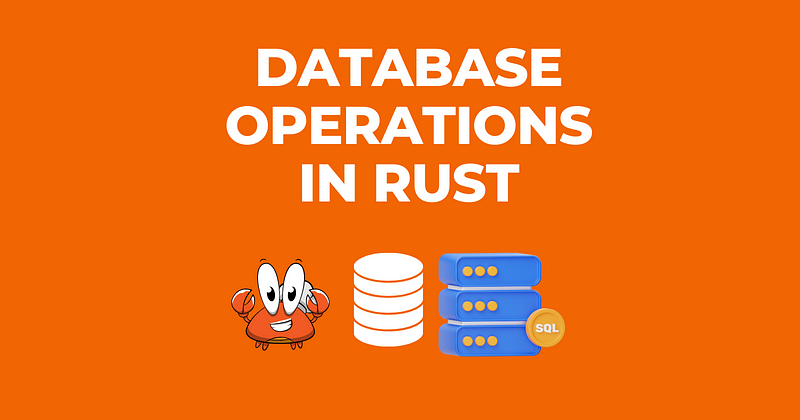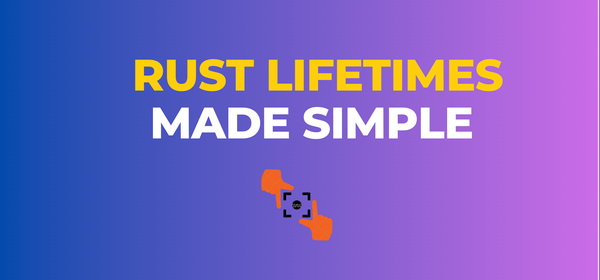Working with Databases in Rust using Diesel
Hey there, Rustacean! 🦀

Hey there, Rustacean! 🦀
Ever felt the itch to seamlessly blend the world of databases with the robustness of Rust?
Well, you’re in for a treat! Meet Diesel, Rust’s answer to type-safe and efficient database operations.
Diesel’s got your back if you’ve struggled with the mismatch between your application’s data structures and your database, or if you’ve yearned for the compiler to have your back when executing those all-important SQL commands.
Dive in with us as we unpack the magic behind Diesel, explore its nooks and crannies, and discover how it can elevate your Rust database game. Ready?
Let’s get started!
What is diesel?
diesel is an Object-Relational Mapping (ORM) and query-building library for Rust. It emphasizes type safety, expressive query building, and performance. Unlike many ORMs in other languages that can be "heavy" and opaque, diesel offers a lightweight approach, putting Rust's type system to good use to ensure safety and correctness.
Why diesel?
- Type Safety:
dieselleverages Rust's type system to catch potential issues at compile time. This reduces runtime database errors that are common with dynamic languages. - Expressive Query Building: Write SQL queries in an idiomatic Rust syntax, making the code clear and concise.
- Performance:
dieselfocuses on zero-cost abstractions and provides an efficient way to interact with databases.
Use Cases:
- Database-backed Applications: Power web applications, backend services, or any application requiring a database.
- Data Migration: Use’s migration handling to evolve your database schema safely.
- Type-safe SQL Querying: When you want to ensure that your SQL queries are type-safe and efficient.
Setting Up Diesel
Before diving into code, we must ensure the Diesel CLI is installed. It assists with tasks such as generating migrations and setting up the database. Install it using:
cargo install diesel_cliNote: Make sure you have the necessary database backends (like PostgreSQL, MySQL, or SQLite) installed, as the CLI will need them.
Initializing a Diesel Project
After you’ve created a Rust project using cargo new your_project_name, navigate into the directory and run:
diesel setupThis command sets up the necessary database configurations and directories for your project.
Configuring the Database
In the root of your project, you’ll find a file named diesel.toml and another named .env. The .env file is where you specify your database URL, such as:
DATABASE_URL=postgres://username:password@localhost/your_database_nameMake sure to adapt this line according to your database backend and credentials.
Creating Migrations
Migrations in the context of databases refer to a set of operations that modify or update the database schema over time. This allows developers to version the database schema, making it possible to upgrade (or even downgrade) a database’s structure in a controlled manner. Diesel provides an excellent system for handling Rust migrations, ensuring they are type-safe and easily managed.
Diesel Migrations: An Overview
In Diesel, migrations are timestamped folders containing two SQL files: up.sql and down.sql. As their names suggest:
up.sql: Contains the SQL necessary to perform the migration and move forward.down.sql: Contains the SQL to undo the migration, essentially reverting the changes.
Setting Up Migrations with Diesel
- Generating a Migration: Use the Diesel CLI to create a new migration:
diesel migration generate migration_nameThis will generate a new timestamped directory under migrations/ with up.sql and down.sql files.
2. Writing SQL for the Migration: Modify up.sql with the desired changes. For example, if you're creating a new table:
CREATE TABLE users (
id SERIAL PRIMARY KEY,
name VARCHAR NOT NULL,
age INTEGER NOT NULL
);Then, in down.sql, you'd typically have the opposite:
DROP TABLE users;3. Running Migrations: To apply your migrations, use the Diesel CLI:
diesel migration runThis command will execute all pending migrations. The CLI will track which migrations have been run in a special schema_migrations table in your database.
4. Reverting Migrations: If you need to revert the most recent migration:
diesel migration revertThis will execute the down.sql for the latest migration.
5. Listing Migrations: To see the status of all migrations:
diesel migration listThis command provides an overview of which migrations have been run and which are pending.
Benefits of Using Diesel Migrations
- Version Control for Database: Just as you version control your code, Diesel migrations allow you to version control your database schema changes.
- Consistency: Migrations ensure that every development team member has the same database structure, minimizing “it works on my machine” issues.
- Safety: Diesel migrations are explicit SQL files that can be reviewed and tested. This reduces the risk of unintended database changes.
- Collaboration: Migrations make it easier to collaborate on projects. When someone pulls the latest codebase, they can also apply the latest database changes locally.
Connecting to the Database
First, make sure to add Diesel and the corresponding database driver as dependencies in your Cargo.toml:
[dependencies]
diesel = { version = "1.0", features = ["postgres"] }
dotenv = "0.15"Replace "postgres" with "mysql" or "sqlite" if needed.
Now, in your main Rust file:
extern crate diesel;
extern crate dotenv;
use diesel::prelude::*;
use dotenv::dotenv;
use std::env;
fn establish_connection() -> PgConnection {
dotenv().ok();
let database_url = env::var("DATABASE_URL").expect("DATABASE_URL must be set");
PgConnection::establish(&database_url).expect(&format!("Error connecting to {}", database_url))
}Querying the Database
Diesel can work with Rust structs to represent database tables. By deriving some Diesel traits, you can perform various operations on the database.
For example, if you have a users table:
#[derive(Queryable)]
pub struct User {
pub id: i32,
pub name: String,
pub age: i32,
}
fn main() {
let connection = establish_connection();
let results = users.load::<User>(&connection).expect("Error loading users");
for user in results {
println!("Name: {} Age: {}", user.name, user.age);
}
}Advanced Features of Diesel
Beyond basic CRUD operations, Diesel offers a plethora of advanced features:
Compile-time SQL Validation
One of the standout features of Diesel is its ability to check your SQL queries at compile-time. It helps catch any potential errors before the application runs.
Custom Queries
While Diesel provides a high-level ORM for common operations, it doesn’t restrict you from writing raw SQL. If you have a specific query that is not easily expressed through the ORM, you can execute it directly. The sql_query function allows you to run custom SQL and map the results to structs.
let custom_users = sql_query("SELECT id, name, age FROM users WHERE age > 30")
.load::<User>(&connection)
.expect("Error loading users");Associations and Joins
Diesel supports database associations like belongs_to and provides a clean API for performing JOIN operations. For example, if you belong to users, you can easily fetch all posts for a specific user.
Insertions, Updates, and Deletions
With Diesel, you can easily perform database write operations. For insertions:
let new_user = NewUser { name: "Alice", age: 30 };
diesel::insert_into(users::table)
.values(&new_user)
.execute(&connection)
.expect("Error inserting user");For updates and deletions, Diesel offers similar straightforward functions.
Transactions
Transactions are essential for maintaining data integrity. Diesel provides an API for executing multiple operations atomically:
connection.transaction(|| {
diesel::insert_into(users::table).values(&new_user).execute(&connection)?;
// ... any other operations
Ok(())
})Best Practices
When working with Diesel:
- Schema First: Always start with a clear database schema and make consistent migrations. Diesel’s migration system helps in maintaining versioned changes.
- Leverage Type System: Make the most of Rust’s type system. Let it catch as many errors at compile time as possible.
- Connection Pooling: For web applications or services with multiple concurrent database accesses, consider using a connection pool like
r2d2with Diesel to optimize resource usage. - Stay Updated: The Rust ecosystem is ever-evolving. Ensure you stay updated with the latest releases and changes in Diesel and other related crates.
Read more articles about Rust in my Rust Programming Library!
Useful resources for learning more about Diesel
Diesel Documentation
One can’t emphasize enough the importance of the official Diesel documentation. It’s comprehensive, providing everything from basic setup to advanced features, making it a great starting point for beginners and an excellent reference for experienced users.
Diesel GitHub Repository
The Diesel GitHub repository is an invaluable resource. Here, you can see ongoing development, raise issues, contribute to the codebase, or understand the internal workings of Diesel.
Alright, fellow Rust enthusiast! 🦀✨
We’ve taken a delightful journey together through the ins and outs of Diesel, haven’t we? From crafting neat SQL operations to diving deep into migrations, we’ve unlocked the power of databases in the Rust universe. As you venture forth, remember the gems we’ve discussed and the community’s treasure trove of resources.
And hey, if you ever stumble upon a neat Diesel trick or create something awesome with it, remember to share with the community. Because, after all, that’s what makes the Rust ecosystem so vibrant and dynamic.
Until next time, keep rusting on and happy coding! 🚀
Read more articles about Rust in my Rust Programming Library!
Visit my Blog for more articles, news, and software engineering stuff!
Follow me on Medium, LinkedIn, and Twitter.
All the best,
CTO | Tech Lead | Senior Software Engineer | Cloud Solutions Architect | Rust 🦀 | Golang | Java | ML AI & Statistics | Web3 & Blockchain



